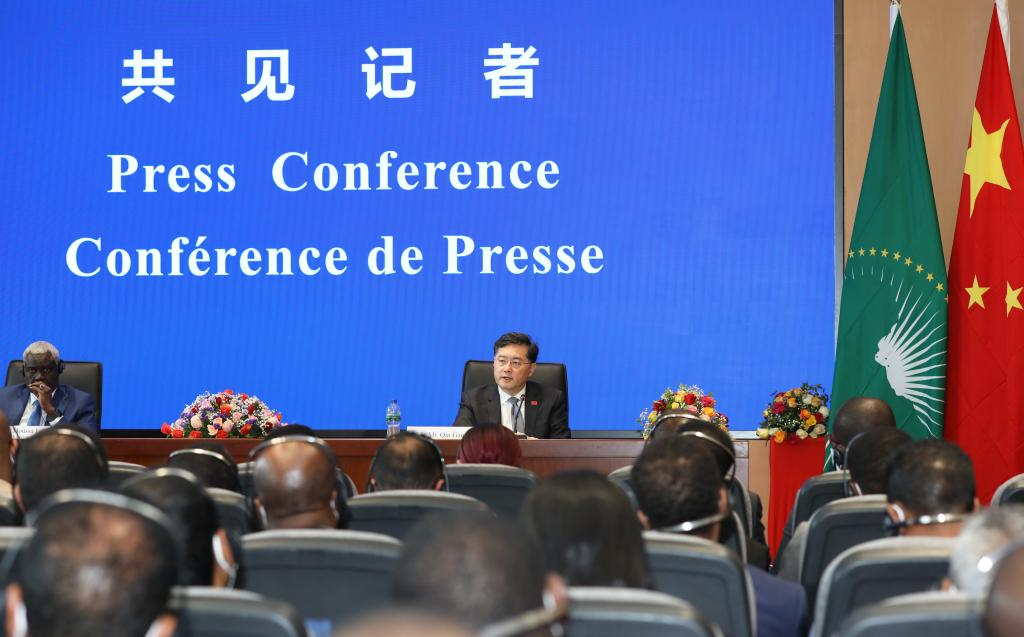
Chinese Foreign Minister Qin Gang addresses the press jointly with Chairperson of the African Union (AU) Commission Moussa Faki Mahamat in Addis Ababa, the capital of Ethiopia, on Jan. 11, 2023.(Xinhua/Dong Jianghui)
ADDIS ABABA, Jan. 11 (Xinhua) -- Chinese Foreign Minister Qin Gang said Wednesday that China stands ready to work with Africa to deepen Sino-African friendly relations and upgrade their cooperation in the new era.
Qin, who addressed the press jointly with Chairperson of the African Union (AU) Commission Moussa Faki Mahamat in Addis Ababa, the capital of Ethiopia, said this year marks the 10th anniversary since Chinese President Xi Jinping put forward the principles of China's Africa policy - sincerity, real results, amity and good faith, and pursuing the greater good and shared interests during his first visit to Africa in 2013.
Over the past decade, thanks to the joint guidance and efforts of Chinese and African leaders, China-Africa relations have made historic achievements that have attracted worldwide attention and entered a new era of forging a high-level China-Africa community with a shared future, Qin said.
At the beginning of the new year, he said, everything will be renewed afresh, and China has embarked on a new journey to build a modern socialist country in all aspects, and the AU and African countries will also mark the 60th anniversary of the founding of the Organization of African Unity (OAU) -- the predecessor of the AU.
Standing at a new historical starting point, China is ready to work with Africa to speed up the implementation of the outcomes of the Eighth Ministerial Conference of the Forum on China-Africa Cooperation (FOCAC) and deepen Belt and Road cooperation, he affirmed.
Qin put forward four proposals on the development of China-Africa relations.
First, he emphasized the need to speed up physical exchanges and sharing of visions between China and Africa.
China will continue to follow the principle of sincerity, real results, affinity and good faith, uphold justice while pursuing shared interests, and expand exchanges and cooperation with Africa in various fields and at all levels, support South Africa in its successful BRICS presidency and Uganda in hosting a successful Non-Aligned Movement summit, Qin said.
China is ready to deepen exchanges and mutual learning on national governance and development experience with Africa, and firmly support each other on issues concerning their respective core interests and major concerns, Qin said, adding that this will lay a solid foundation for building a high-level China-Africa community with a shared future.
Second, Qin called for the deepening of friendly relations between China and the AU, adding that as China's modernization drive provides new opportunities for Africa, it will continue to support the African Union in leading African countries on a development path suited to their national conditions.
He reiterated China's readiness to further facilitate the synergy of its development strategy with those of African countries and the AU Commission, and help advance Africa's integration.
China has taken the lead in supporting the AU's membership in the Group of 20 (G20) and advocates a bigger role for the AU and African countries in the global governance system, Qin said.
Third, Qin said, greater efforts should be made to upgrade China-Africa cooperation, accelerating the implementation of the outcomes of the Eighth Ministerial Meeting of the FOCAC, continuing to expand trade with Africa, promoting high-quality development of China-Africa financing and investment cooperation, and broadening new drivers of growth in health, green development and digital economy to provide more support for Africa's economic and social development.
Fourth, Qin noted the need to firmly safeguard solidarity and cooperation among developing countries.
He emphasized the imperative to uphold confidence and self-reliance, uphold the common values of humanity, oppose hegemonic, high-handed, bullying, and racially discriminatory acts, jointly uphold genuine multilateralism, promote democracy in international relations, raise the representation and voice of developing countries, especially African countries, at the United Nations Security Council and other international organizations, and work together to make the global governance system more just and equitable. ■



